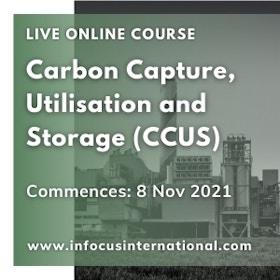
Overview
This course is intended for those in business, commercial and strategically focused roles within the energy sector; in particular those responsible for environmental matters, business sustainability and business transformation in areas such as oil & gas, hydrogen and industrial energy usage.
You will leave with a clearly explained and independent perspective on how, where and why CCUS is happening now and could grow in future – covering the range of technological solutions and business drivers, including policy. In addition to reviewing existing CCUS approaches, the course will highlight new opportunities and integrated value creation possibilities through carbon utilisation. This will include how the fate of CCUS links to other aspects of the clean energy transition, such as clean hydrogen production, industrial decarbonisation and the transition away from oil & gas.
Course sessions
1. CCUS technologies and markets
2. Industrial clusters, hydrogen and carbon utilisation
3. Growing CCUS market opportunities: policies, markets & barriers
Benefits of attending
- Understand the most challenging aspects of the clean energy transition & the role of CCUS in addressing them
- Examine the various technological aspects of the CCUS value chain, from capture through to storage and/or utilisation pathways
- Discuss the key economic and policy variables which will determine how CCUS plays out in different markets
- Review up-to-date examples of projects and strategies from around the world, and evaluate the lessons from them
- Learn the dynamics of the new competitive environment, including the risks of ‘business as usual’ and the importance of industrial clusters in CCUS deployment
- Identify approaches to sustainable strategic planning and new business opportunity assessment
Testimonials
“This was one of my best spent weeks on training all year! I found him very knowledgeable and enthusiastic in presenting the material, also enabling knowledge exchange between participants in the group. Thanks.”
- Statkraft Development AS
“The course was well researched, interesting and on point.”
- Tullett Prebon
“You provide an excellent course. I will without a doubt recommend it to anyone interested in the interplay between energy storage systems, electricity networks and energy markets, policies, procurement and regulations. Trainer’s knowledge and group interaction makes the course not only highly informative, but also engaging and fun as we learn how to successfully transition to more environmentally sustainable energy systems.”
- Department of Energy
Live online course - How it works
The structure of our virtual learning program is designed to keep the same levels of engagement and networking as our on-site public courses. Course content is delivered through our easy-to-use online learning platform and is supplemented by case studies and practical exercises.
Like our classroom-based public courses, you will have live interaction with our course facilitators and other participants. Our live online courses are led by our experienced instructors, who will provide you with easily digestible content, using knowledge learned from many years in the industry, during scheduled times. Delegates will receive copies of the course materials electronically.
This course is scheduled to take place over 3 live online sessions using virtual learning technology.
To register/enquire, please contact:
Abigail Harris
Infocus International Group
Tel: +65 6325 0215 | Email: abigail[at]infocusinternational.com
Web: https://www.infocusinternational.com/ccus
Kontak sponsor/pameran
Abigail Harris
[javascript protected email address]
Publish your content with EB Publishing
It's about who you reach. Get your news, events, jobs and thought leadership seen by those who matter to you.




